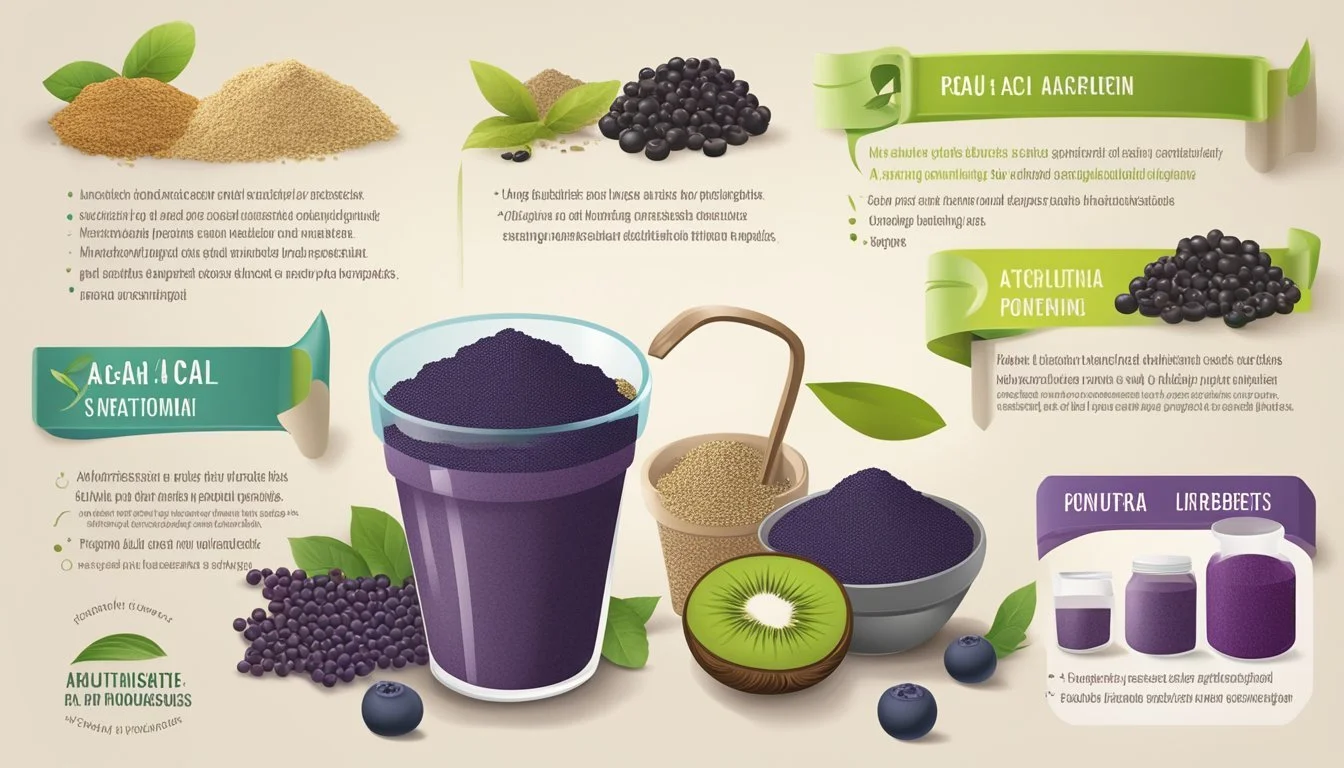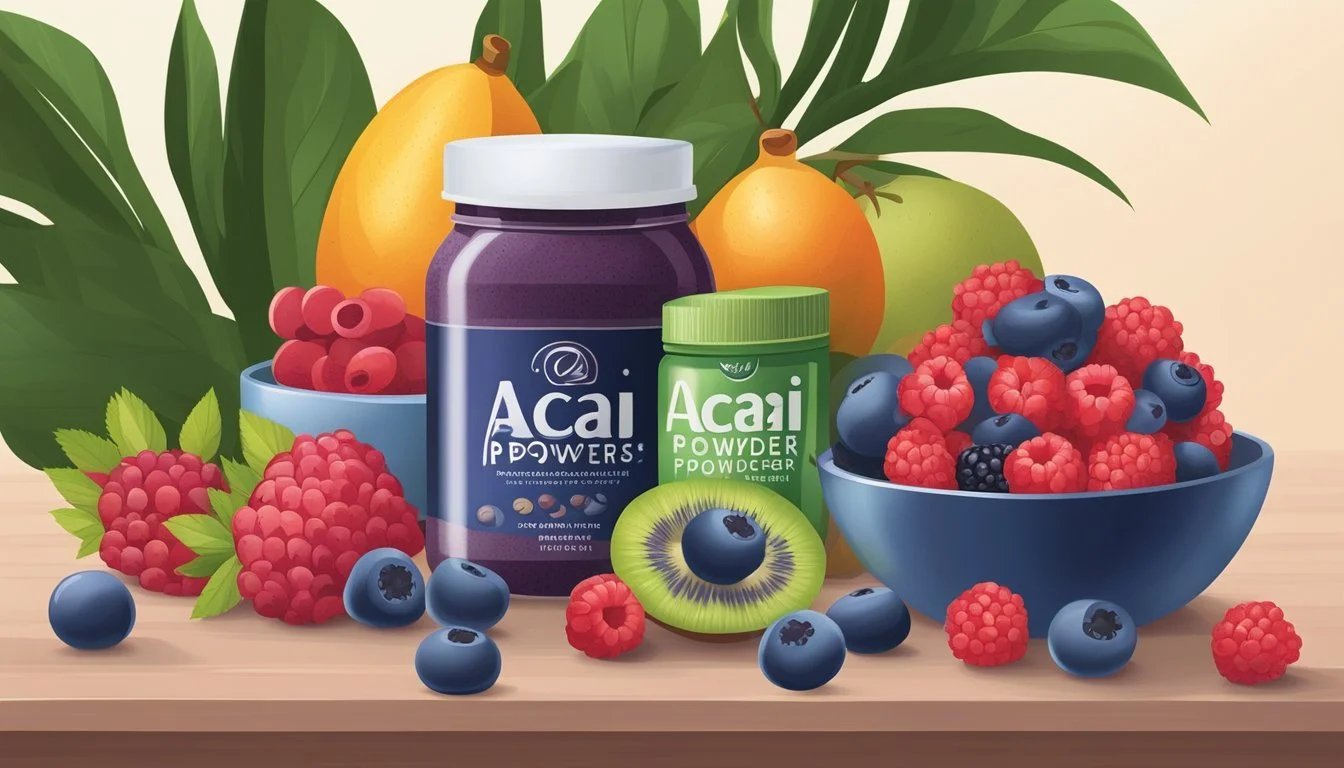Acai Powder Substitutes
Top Alternatives and Their Benefits
Finding a substitute for acai powder is essential for those who love its rich flavor but may find it difficult to source or wish to explore other options. Several alternatives, such as beet powder, amla powder, and mulberry powder, offer similar health benefits while adding unique flavors and nutrients to your dishes. These substitutes not only add variety but also ensure you don’t miss out on the superfood benefits acai provides.
Beet powder, for instance, can replace acai in smoothie bowls, muffins, and other baked goods without compromising on nutrition. Amla powder, also known as Indian gooseberry, packs a powerful vitamin C punch, making it an excellent choice for boosting your immune system. For a sweeter option, consider mulberry powder, which brings a mildly sweet flavor along with a solid nutritional profile.
When fresh acai berries are hard to come by, fruits like blackberries, blueberries, cranberries, goji berries, and pomegranates step up as excellent alternatives. Each of these fruits offers a unique combination of antioxidants, vitamins, and vibrant colors to enhance your meals while ensuring you harness the health benefits typically associated with acai.
Understanding Acai Powder
Acai powder is derived from acai berries, which grow on the acai palm tree native to Brazil and other parts of South America. The berries are small, dark purple, and have been touted as a superfood due to their high antioxidant content.
Acai berries are known for their antioxidants that help combat oxidative stress. These antioxidants can contribute to reducing inflammation and promoting overall cellular health.
The nutritional profile of acai powder includes vitamins A, C, and E, along with dietary fiber. These nutrients support immune function, skin health, and digestive health.
Health Benefits of acai powder:
Supports heart health by potentially reducing cholesterol levels.
Provides anti-inflammatory benefits due to high antioxidant content.
Promotes skin health with vitamins and antioxidants.
Acai powder is often used in smoothies, bowls, and even baked goods. It offers a convenient way to enjoy the benefits of acai berries without needing fresh fruit, which can be difficult to source outside South America.
Acai berries' taste is often described as a blend of berries and chocolate, making the powder a flavorful addition to various dishes. Using acai powder allows the incorporation of this unique flavor into daily diets easily.
Nutritional Profile of Acai
Acai berries are known for their dense nutritional content, offering a range of vitamins, minerals, and antioxidants. Acai powder retains many of these beneficial compounds, providing a convenient and concentrated source of nutrition.
Vitamins and Minerals
Acai powder is rich in various vitamins and minerals.
It contains Vitamin A, which is essential for eye health.
Vitamin C is present, promoting a healthy immune system.
Vitamin K supports blood clotting and bone health.
Among minerals, Iron is notable for its role in oxygen transport and energy production. Calcium contributes to bone strength, while Potassium regulates fluid balance and muscle function. Additionally, Manganese helps in bone formation and metabolic processes.
A notable amount of fiber is also present. This assists with digestion and can help maintain a healthy weight.
Antioxidants and Phytochemicals
Acai powder is celebrated for its high antioxidant content. These antioxidants protect cells from damage caused by free radicals.
A key group of antioxidants found in acai is anthocyanins, which give the berries their distinctive dark purple hue. These compounds are linked to reduced inflammation and improved heart health.
Phytochemicals, including various polyphenols, also play a significant role. They contribute to the overall antioxidant capacity of acai. Regular consumption of foods rich in these antioxidants can help in reducing the risk of chronic diseases.
Lastly, acai has small amounts of protein and healthy fats, including Omega-9 and saturated fats. These fats are vital for overall health and energy.
Benefits of Acai
Acai powder offers numerous health advantages. Rich in antioxidants, it supports heart health, aids digestion, and promotes cognitive function.
Heart Health
The consumption of acai powder can improve heart health due to its high antioxidant content. Antioxidants like anthocyanins contribute to reducing oxidative stress and inflammation, which are linked to heart diseases.
Acai is also a good source of healthy fats, particularly omega-6 and omega-9 fatty acids. These fats help reduce cholesterol levels and improve overall cardiovascular function. The presence of fiber in acai can aid in managing cholesterol, further supporting heart health.
Digestion and Regularity
Acai powder contains dietary fiber, an essential component for healthy digestion. Dietary fiber promotes regular bowel movements, reducing the risk of constipation. It also supports the growth of beneficial gut bacteria, which play a crucial role in digestion and maintaining gut health.
Additionally, acai has been noted for its natural detoxifying properties. This can help cleanse the digestive system of toxins and improve nutrient absorption. Regular consumption of acai powder can contribute to better digestive health and regularity.
Cognitive Function
The antioxidants in acai play a significant role in supporting cognitive function. Antioxidants help protect brain cells from oxidative damage, which can lead to cognitive decline over time. By reducing this oxidative stress, acai can help maintain brain health and improve mental clarity.
Acai also contains compounds that have anti-inflammatory properties. Inflammation is a known factor in the development of neurodegenerative diseases. By reducing inflammation, acai may help protect against conditions such as Alzheimer's disease.
Furthermore, the nutrients in acai, including omega fatty acids, contribute to overall brain health by supporting various neuronal functions. Regular consumption of acai powder can thus aid in maintaining cognitive function and mental acuity.
Popular Acai Products
Acai products have grown in popularity due to their high nutritional content and versatility. This section will explore how acai is used in traditional bowls, smoothies, beverages, snacks, and baked goods.
Traditional Acai Bowls
Traditional acai bowls are a staple for anyone looking to enjoy this superfood. They typically include frozen acai, which is blended into a thick, smoothie-like consistency. Common toppings include granola, banana slices, and various other berries.
Acai bowls are not only visually appealing but also nutritious. They provide a burst of antioxidants, vitamins, and minerals. The customizable nature of acai bowls allows for variations that can cater to both sweet and tart tastes. Often, these bowls are also topped with nuts, seeds, and coconut flakes for added texture and health benefits.
Smoothies and Beverages
Acai is a popular ingredient in many smoothies and beverages. Acai juice and acai smoothie recipes are frequent choices for those looking to incorporate this fruit into their diet. Mixed with fruits like bananas, strawberries, or blueberries, acai smoothies are both delicious and nutritious.
These beverages offer a convenient way to consume acai, especially for those on the go. They often combine acai berries with other nutrient-dense ingredients like spinach, chia seeds, or almond milk. Adding acai powder to smoothies enhances the flavor profile while ensuring a high intake of antioxidants and essential fatty acids.
Snacks and Baked Goods
Acai has found its way into various snacks and baked goods. Products such as acai-flavored granola bars and muffins are becoming more common. These snacks are perfect for those seeking a healthy alternative to traditional sweets.
In baked goods, acai powder is often used to add a nutritional boost. It can be incorporated into recipes for cakes, cookies, and even bread. The tartness of acai blends well with the sweetness of other ingredients, making it a versatile addition. Moreover, acai's vibrant color can make baked goods visually striking, adding to their appeal.
Acai Powder Substitutes
When substituting acai powder, options largely vary from berry-based powders to other fruit-based substitutes and superfood powders. Each alternative offers unique benefits, giving the flexibility to achieve desired flavors, colors, and nutritional profiles.
Berry Powders as Alternatives
Berry powders are popular substitutes for acai powder because of their rich antioxidant content and vibrant color. Blackberry powder is an excellent option as it has a dark purple color and a sweet-tart flavor. Blueberry powder offers a sweeter alternative, with less acidity compared to acai.
Cranberry powder is another solid choice, especially for those who enjoy a tangy taste. This powder is rich in Vitamins A, C, and E, enhancing the nutritional profile of your dish. Pomegranate powder is also favored for its tangy and mildly sweet flavor, along with its antioxidant properties.
Other Fruit-Based Substitutes
Several fruit-based substitutes can effectively replace acai powder. Goji berries provide a nutritional boost with plenty of antioxidants and a mild sweetness. They can be added as whole berries or a powdered form.
Mangoes and mixed berries are also viable alternatives. Mango powder adds a tropical sweetness, while mixed berry powders combine the benefits of multiple berries, offering a rich flavor and diverse nutrients. Incorporating fruit juices like cranberry or pomegranate juice can also mimic the taste and health benefits of acai.
Superfood Powders
Beyond berries, superfood powders offer diverse benefits. Cacao powder and cocoa powder provide not only antioxidants but also a rich, chocolatey flavor that complements various recipes. These substitutes are particularly good in smoothies and baked goods.
Other superfood powders, such as spirulina and chlorella, can add unique nutritional benefits, albeit with different tastes. Though not berries, these superfood powders enhance the antioxidant content of your meals and boast numerous health advantages.
Using these substitutes allows one to tailor recipes while preserving key health benefits, creating versatile and nutritious dishes.
How to Use Acai Substitutes in Recipes
Acai powder can be replaced with a variety of alternatives that offer similar nutritional benefits and flavors. Here are specific ways to incorporate these substitutes into your recipes effectively.
Creating the Perfect Smoothie
Using acai substitutes like blueberry or blackberry powder in smoothies can provide a comparable taste and nutritional boost. Start with frozen fruits such as bananas, blackberries, or blueberries.
Add a scoop of your chosen powder, a tablespoon of nut butter, and a handful of spinach or kale for added healthy fats. Blend with milk or non-dairy milk until smooth. For added protein, consider including a scoop of protein powder.
Adjust the sweetness with honey, agave nectar, or liquid stevia as needed.
Toppings for Breakfast Bowls
In breakfast bowls, substitutes like pomegranate or mulberry powder can add flavor and color. Mix the powder with yogurt or smoothie base made from bananas and non-dairy milk.
Top your bowl with granola, nuts, hemp hearts, and chia seeds. Drizzle with honey or maple syrup for sweetness.
Adding fresh fruits and nut butter can enhance both texture and taste, creating a nutritious and satisfying breakfast option.
Sweetening Baked Goods
For baked goods, cranberry or amla powder can replace acai powder to achieve a similar tangy taste. Use a 1:1 substitution in recipes for muffins, cakes, or cookies.
Cranberry powder adds a punch of Vitamin C and a hint of acidity. If using powders like amla, start with a smaller amount to avoid overpowering other flavors.
Incorporate the powder into dry ingredients and adjust liquid content if necessary. Ensure thorough mixing for an even distribution of flavor and nutrients.
Considerations When Choosing Substitutes
When choosing an alternative to acai powder, it's essential to consider flavor profile, nutritional equivalence, and availability. Each substitute has its unique characteristics that can affect the final outcome of your dish or drink.
Flavor Profile and Acidity
Substitutes like blueberries and raspberries provide a similar earthy and slightly tart flavor compared to acai powder. Blueberries bring a mild sweetness, balancing well in smoothies and bowls. Raspberries offer more acidity, which can enhance recipes requiring a tangy kick.
Cranberries are high in acidity and pair well in desserts and sauces. Acerola powder mimics acai's tartness but might not provide the same vibrant color. Cocoa powder can also be added to achieve a bitter note similar to acai.
Table Example:
Substitute Flavor Profile Acidity Level Blueberries Sweet and mild Low Raspberries Tart and fruity Medium Cranberries Highly acidic and tart High Cocoa Powder Earthy and bitter Low Acerola Powder Tart and slightly sweet Medium
Nutritional Equivalence
Focus on substitutes that retain the nutritional benefits similar to acai berries. Acai is known for its rich antioxidant content and low-calorie profile. Blueberries and goji berries are notable alternatives as they provide antioxidants and other nutrients like vitamin C and fiber.
Raspberries are high in fiber and vitamin C, supporting overall health. Pomegranates also offer antioxidants and vitamins, making them a good replacement. Though substitutes might vary slightly in calories, carbohydrates, and fat, they often bring similar health benefits as acai berries.
Nutritional Comparison:
Substitute Antioxidants Calories Carbohydrates Fat Blueberries High Low Moderate Low Raspberries High Low High Low Goji Berries High Low Low Low Pomegranates High Low Moderate Low Acerola Powder Moderate Low Low Low
Availability and Convenience
Availability is a significant factor in choosing acai powder substitutes. Frozen berries like blueberries and raspberries are easy to find in most supermarkets and offer the convenience of long shelf life. Cranberries and pomegranates are often available fresh or frozen, providing flexibility for various recipes.
Organic options ensure fewer pesticides and higher nutritional quality. Brands offering freeze-dried powders of substitutes like acerola or goji berries make it simple to replace acai powder in dry form. Always consider local availability and your specific recipe needs when selecting a substitute.
Convenience:
Frozen fruit: Long shelf life, easy to store.
Fresh berries: Better texture and flavor, higher perishability.
Organic choices: Higher quality, environmentally friendly.
Powders: Simple substitution for dry recipes, easy measurement.
Carefully balancing these considerations will help you choose the best substitute for acai powder suitable for your needs and culinary creations.








